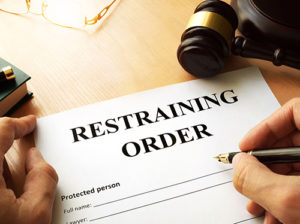Hassett & Associates, P.A.
Call 24/7 - (954) 791-3939 | Hablamos Español
Call 24/7 – (954) 791-3939
There are several different types of injunctions that can be issued in Florida. The various types are discussed below.
Under § 741.28, Fla. Stat. (2022), domestic violence is defined as one of the following acts committed against a household or family member:
To get a domestic violence injunction, the petitioner must currently live or have previously lived with the respondent, or the two must share a child. A petitioner must have proof that they were the victim of domestic violence or that they have reason to fear that they will be the victim of domestic violence at the hands of the respondent.
A person can also seek a dating violence injunction based on violence by the target against the petitioner within the context of an ongoing romantic or intimate relationship under § 784.046, Fla. Stat. (2022). If the relationship has ended, the petitioner must have been involved with the respondent for six or more months before filing the petition.
An injunction against repeated violence is also allowed under § 784.046, Fla. Stat. (2022). Repeated violence is defined as two violent incidents or stalking committed by the respondent within six months of when the petition is filed that were directed at the petitioner or the petitioner’s immediate family member.
The third type of injunction found in § 784.046, Fla. Stat. (2022) is an injunction against sexual violence. Sexual violence includes the following acts committed by the respondent:
A petitioner does not need to have a pending criminal case to get an injunction against sexual violence and can also petition the court for one even if a criminal case for the alleged act was dismissed.
Under § 784.0485, Fla. Stat. (2022), a person can petition the court for an injunction against stalking. Stalking is defined as including repetitive, malicious, and intentional harassment or following of the petitioner by the respondent. Cyberstalking occurs when a respondent directly communicates with the petitioner by email, text messages, or other electronic means for an illegitimate purpose that results in the victim’s serious emotional distress.
The Fort Lauderdale restraining order process begins when a person files a petition for a specific type of injunction. Once the petition is filed, the court will determine whether to grant a temporary injunction. The petitioner must present the judge with clear and convincing evidence that stalking, repeat violence, dating violence, sexual violence, or domestic violence has occurred.
In many cases, the court will issue a temporary injunction against the respondent without a hearing immediately unless the petition is insufficient on its face. If the petition is granted, the court will then schedule a final hearing to determine whether to issue a permanent injunction 15 days following the date the temporary injunction is served on the respondent. At this hearing, the respondent can present evidence and call witnesses to defend against the injunction.
Some people think that they can represent themselves at a permanent injunction hearing. While you are not required to retain a lawyer, trying to represent yourself without the help of an experienced Fort Lauderdale injunction lawyer can result in serious consequences. If a permanent injunction is issued against you, you will be prohibited from having contact with the petitioner and might lose your civil rights to own or possess a firearm. Being the subject of a permanent injunction might also cause problems with a pending divorce or child custody case. Finally, even though an injunction is a civil order, violating it can result in criminal charges that come with severe penalties.
If a temporary injunction is issued, it will generally be valid for 15 days. However, if the respondent is in custody, the temporary injunction will be effective for 15 days following the respondent’s release from jail or prison. The court can also continue the injunction hearing at its discretion.
If a permanent injunction is issued, there is no time limit. It will remain valid until it is dissolved or modified. Both the respondent and the petitioner are allowed to request dissolution or modification of a permanent injunction.
Injunctions come with numerous consequences. An injunction can’t be expunged or sealed since it is a civil matter. This means that it will be a matter of public record and can be easily seen by potential employers and others.
If an injunction is issued against you, it can negatively impact you in a pending or future custody dispute, divorce, or another family law case. In custody disputes, an injunction against a party can have a significant impact on the court’s decision on residential and legal custody of the child.
Finally, an injunction will result in a loss of the civil right to own or possess firearms. The restrained person will have to surrender their firearms to local law enforcement. If the injunction is dismissed or denied at the permanent injunction hearing, Fort Lauderdale criminal defense lawyer Kenneth P. Hassett can file a motion to secure the return of his client’s firearms.
After a petitioner is granted an injunction, they can call the police to report that the respondent violated it. For example, if you happen to run into the petitioner at a local store, the petitioner can file a report with the police, resulting in your arrest for violating the injunction against you.
While injunctions are available for good reasons, some people abuse the system and make false allegations to secure injunctions. Some of the common scenarios involving false allegations to try to get injunctions in Florida include the following:
All of the different types of injunctions in Florida share the following similarities:
The different types of injunctions also have some differences.
In a domestic violence injunction, the petitioner and respondent must either be household or family members who reside with each other unless they share a child. The parents do not have to have lived together or have been married. An alleged victim must show that they have been the victim of domestic violence or that they have a reasonable belief that they are in danger of it. A domestic violence injunction protects adults from violence and contact, and the terms of the order can include the petitioner’s children.
If the petitioner and respondent live in a shared home, the respondent will be forced to leave, and the petitioner will be allowed to remain. The respondent will be prohibited from being near the shared home or the petitioner’s residence, and the petitioner might have custody of the children 100% of the time. The petitioner might also be entitled to receive temporary support from the respondent, and the respondent will be required to surrender their firearms either temporarily or permanently. Finally, the court can require the respondent to attend a batterer’s intervention program.
For a dating violence injunction, the petitioner and respondent must be or have been involved in a romantic or intimate relationship for the previous six or more months. The relationship cannot just have been casual. The petitioner must show that they have been the victim of dating violence or have a reasonable belief that they are in imminent danger of being the victim of dating violence. A request for a dating violence injunction can be filed by the guardian or parent of a minor living in the home. The victim can also file a petition. Dating violence injunctions protect both adult and child victims of dating violence against further violence or contact. The subject of a dating violence injunction might have to surrender their firearms.
To get a repeat violence injunction, the petitioner will have to show that there have been two or more incidents of violence or stalking committed by the respondent against the petitioner or the petitioner’s immediate family member. At least one of the incidents must have happened in the previous six months. The petitioner must have a reasonable belief that they are in danger of repeated episodes of violence committed by the respondent. A guardian or parent of a minor child living at home or the victim can file a petition for a repeat violence injunction. If the injunction is issued, the respondent might be forced to surrender their firearms.
A petitioner for a sexual violence injunction will have to show the court that one of the prohibited acts was committed by the respondent. Following a report of sexual violence, the petitioner must fully cooperate with law enforcement during their investigation. This type of injunction also protects a petitioner from a respondent after the respondent is released from prison or is scheduled to be released within 90 days. A petition for a sexual violence injunction can be filed by the guardian or parent of a minor remaining in the home or by the victim. This type of injunction protects adults and children against violence and further contact. If the injunction is issued, the respondent might be forced to surrender their firearms.
To get a stalking injunction, the petitioner must show that a minimum of two incidents of stalking or cyberstalking were committed by the respondent against the petitioner. The parent or guardian of a child remaining in the home or the victim can file the petition. A stalking injunction protects adults and minors from future stalking and cyberstalking. If a permanent injunction is ordered, the respondent will be forced to surrender their firearms. The court can also require the respondent to attend court-ordered treatment.
 Difference Between a Fort Lauderdale Restraining Order Vs. an Injunction
Difference Between a Fort Lauderdale Restraining Order Vs. an InjunctionA restraining order is temporary. By contrast, a protective injunction request will result in a hearing. The restraining order will be in place until the hearing is held. Once the hearing occurs, the court can issue a protective injunction permanently if the judge believes it is necessary to ensure the petitioner’s safety.
If you violate a protective injunction, you can be charged with a first-degree misdemeanor and face a maximum term of 12 months in jail and a fine of $1,000. You can also face additional charges based on the nature of your violation. For example, if you stalk the victim listed in an injunction against stalking issued against you, your stalking charge will automatically be enhanced to aggravated stalking. This offense carries a potential sentence of 15 years and a $15,000 fine.
If you have been served with a Fort Lauderdale restraining order, you have the right to challenge it at the permanent order hearing. In many cases, courts issue temporary injunctions with minimal justification and evidence. Criminal defense lawyer and Fort Lauderdale injunction lawyer Kenneth P. Hassett has years of experience helping people fight orders of injunction and allegations of violations of protective injunctions. To learn more about how we can help, contact the law firm of Hassett & Associates, P.A. at (954) 791-3939.
Fill out this form to have your case reviewed by one of our attorneys.
Charges: Injunction for Protection Against Repeat Violence
County: Miami-Dade
Facts: Alleged 15 year old female Victim claimed that Defendant was harassing her
Results: Case Dismissed
Charges: Repeat Violence Injunction
County: Miami-Dade
Facts: Alleged Repeat Domestic Violence, Hitting a Family Member or person in Home
Results: Case and Order for Protection Dismissed
Kenneth P. Hassett, Esq. Awards & Ratings



